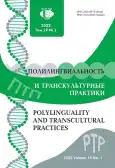Language Code Mixing in the Discourse of IT Companies
- Authors: Poplavskaya T.V.1, Choumanskaya O.A.1
-
Affiliations:
- Minsk State Linguistic University
- Issue: Vol 19, No 1 (2022)
- Pages: 98-106
- Section: Language Processes
- URL: https://journal-vniispk.ru/2618-897X/article/view/326783
- DOI: https://doi.org/10.22363/2618-897X-2022-19-1-98-106
- ID: 326783
Cite item
Full Text
Abstract
The mixing of English with national languages in business communication is a consequence of global processes: the development of transnational corporations, modern technologies, the intensification of communication flows and the dominance of English in intercultural communication. Mixing and switching of language codes is quite often observed in the corporate media discourse of IT companies. For organizations in this sphere, English is the main language of business communication, but its use goes beyond professional slang and terminology, creating characteristic forms of language codes mixing. The purpose of the research presented in the article is to identify and analyze situations of mixing English and Russian in the corporate media discourse of IT companies. The research material was corporate media texts in Russian and English posted on the pages of official websites, corporate blogs and in the social networks Twitter and Facebook. In the analyzed texts in Russian, English inclusions (phrases, individual words and their parts) are often observed to denote work programs and tools, corporate events. As part of the professional slang of IT professionals, English words are transmitted using the Cyrillic alphabet and in accordance with the rules of Russian grammar. The influence of English on Russian media discourse in the IT field is also observed in the expansion of the meanings of some words. In Russian media texts, there are also phrases that are not typical for the Russian language, but represent a literal translation of English phrases. English-language sentences are used in Russian texts as mottos or slogans of the company, as congratulations or advice. As a result of the content analysis of the selected media texts, it was also found that along with the English language, the values typical for the discourse of American corporations are being borrowed. It was found that the value dominants of the corporate discourse of IT companies are “change” and “progress”, “success”, “equality”, “partnership”.
About the authors
Tat’yana Viktorovna Poplavskaya
Minsk State Linguistic University
Author for correspondence.
Email: taniapoplavskaia@gmail.com
ORCID iD: 0000-0002-3228-7750
Doctor of Philology, Full Professor, Head of Speechology and Communication Theory Department
21, Zaharova Str., Minsk, 220034, Republic of BelarusOlga Anatol’evna Choumanskaya
Minsk State Linguistic University
Email: olga.shumanskaya@gmail.com
ORCID iD: 0000-0002-4415-0014
Senior Teacher of Speechology and Communication Theory Department
21, Zaharova Str., Minsk, 220034, Republic of BelarusReferences
- Kaplan, R.B. 2001. In The dominance of English as a language of science: effects on other languages and language communities. Berlin: Mouton de Gruyter: 3-26.
- Kaplan, R.B. 2001. English - the accidental language of science? Berlin; New York: 3-26.
- Crystal, D. 2003. English as a global language. Second ed. Cambridge: Cambridge Univ. Press.
- Hall, S., Hobson, D., Lowe, A., Willis, P. 1980. Culture, media, language: working papers in cultural studies. London: Hutchinson. Print.
- Sing, S.C. 2017. English as a lingua franca in international business contexts: pedagogical implications for the teaching of English for specific business purposes. Handbook of business communication: linguistic approaches. Berlin: De Gruyter Mouton: 319-356.
- Berelson, B. 1952. Content analysis in communication research. Glencoe: Free Press.
- Holsti, O.R. 1969. Content analysis for the social sciences and humanities. Reading: AddisonWesley.
- Efimova, N.V. 2015. Praktikum po kontent-analizu : ucheb.-metod. posobie. Minsk: BGU publ. Print. (In Russ.)
- Lasswell, H. 2007. Pochemu kolichestvennyj metod [Why be Quantitative]. Politicheskaja lingvistika 2 (22): 177-186. Print. (In Russ.)
- Miatlushka, I.U. 2015. Kul’turno-tematicheskie dominanty hudozhestvennogo diskursa i jazykovye sredstva ih realizacii (na materiale anglijskogo i belorusskogo jazykov) [Сultural and Thematic Dominants in Belles-Lettres Discourse and Language Means of their Representation (the English and Belarusian Languages)] PhD diss., MSLU publ. Print. (In Russ.)
- Choumanskaya, O.A. 2019. Kontent-analiz anglojazychnogo mediadiskursa belorusskih ITkompanij [The Content-analysis of the Belarusian IT-companies discourse in the English language], 72-79. Vestnik MGLU. 1. Filologija. Print. (In Russ.)
- Shigabetdinova, G.M. Partnerstvo kak konstruktivnoe vzaimodejstvie: teoreticheskaja jekspozicija problemy [Partnership as a constructive interaction: theoretical exposition of the problem] http: // www.fundamental-research.ru/ru/article/view?id=33611. Web. (In Russ.).
- Doran, C.J. Measuring mainstream US cultural values. J. of Business Ethics. 2013. 117 (2): 261-280.
- Perrucci, R., Perrucci, C.C. The good society: core social values, social norms, and public policy. Soc. Forum. 2014. 29 (1): 245-258.
- Steele, Edward D. 1962. The American Value System: Premises for Persuasion. Western Speech 26 (2): 83-91.
Supplementary files









